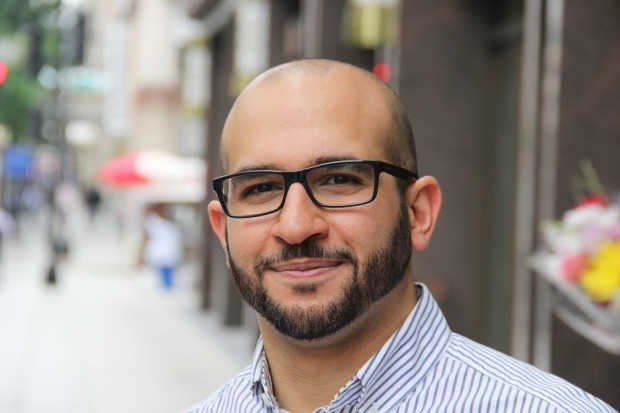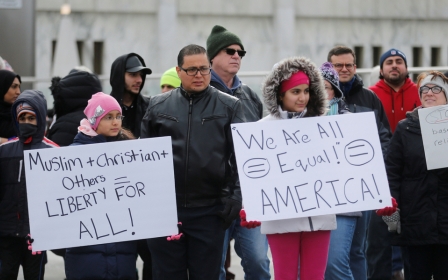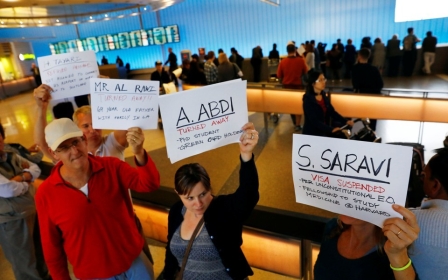Trump’s 'anti-Muslim' drive may have only just begun
NEW YORK, United States – These are perilous times for Ibrahim al-Assil, a Syrian political activist. He applied for asylum while visiting the United States in 2014, fearing a return to his country’s civil war and being tortured by President Bashar al-Assad’s henchmen again, as he put it.
The relative security of his life in the US is being turned upside down by President Donald Trump’s new administration, which has banned travel from Syria and six other mostly Muslim countries, and is set to take further steps likely to impact Muslims.
For Assil, a 31-year-old Sunni Muslim from Damascus, the Sword of Damocles looms large. He fears being caught up in Trump’s flurry of executive orders, which are ostensibly designed to thwart militants, having his claim rejected and being deported back to war-ravaged Syria.
“For Syrian asylum seekers in the US, we’re not very optimistic about the next four years and what might happen here,” Assil told Middle East Eye, after an anxious weekend spent tracking the news, social media and protesting outside the White House.
“For many of them there is no place to go. Even for me. I can’t go back to Syria. I’d be detained and most likely killed. And I can’t go to anywhere else outside of the United States. I don’t even have a passport.”
By executive order on Friday, Trump banned immigration from Iran, Iraq, Syria, Libya, Somalia, Sudan and Yemen and temporarily halted refugee entries. At airports, security officials struggled to consistently enforce the new rules, detaining, questioning and deporting some arrivals.
It sparked an outpouring of anger and protests in New York, Los Angeles, San Francisco and other cities – underscoring a long-standing fissure in American society that widened during a 2016 election that posited coastal elites and minorities against white, Middle America.
Trump administration officials say travel bans are a common-sense response to the 2015 mass shooting in San Bernardino, California, the Boston Marathon bombing and multiple attacks by radicalised Islamic groups in Europe.
Broadly, the public agrees. A national Quinnipiac University poll this month found that 48 percent of American voters support “suspending immigration from terror-prone regions,” while 42 percent opposed such a step, which has been dubbed a “Muslim ban”.
Such results may embolden Trump to ignore the backlash and use executive powers to clamp down on the Muslim Brotherhood, derail Palestine’s quest for statehood and re-start schemes for harsh interrogations of terror suspects.
Such steps, which are reportedly discussed in the Oval Office, have raised fears among an estimated 3.3 million American Muslims that Trump’s officials are not only deterring terrorists, but also intend to ostracise their faith.
They point to his hard-liners, such as National Security Adviser Michael Flynn, who dubbed Islamism a “vicious cancer,” and chief strategist Stephen Bannon, who amplified anti-Islam voices while CEO of the hard-right Breitbart News.
Muslim Brotherhood targeted
Administration officials are reportedly debating whether the US should declare the Muslim Brotherhood, an Islamist political and social network, as a terrorist organisation and subject it to US sanctions.
Some conservative and anti-Muslim activists have argued for years that the Brotherhood, which was founded in Egypt in 1928 and sought to peacefully establish a worldwide Islamic caliphate, is a breeding ground for terrorists.
Its Palestinian branch, Hamas, has engaged in violence against Israel, but other groups of the Brotherhood have evolved peacefully and play roles in democratic politics in Tunisia, Turkey and elsewhere.
“It’s going to be very hard for Muslims around the world to understand this as anything other than … a war against Islamism in all its peaceful forms as well as militant or violent forms, and it could be understood as a war against Muslims or even against Islam itself,” Dunne told MEE.
Re-classifying the Brotherhood would make it illegal for people in the US to knowingly provide it with “material support,” opening the door to FBI probes of US-based Muslim groups that have links with the Brotherhood, added Dunne.
Black sites review
Other policies reportedly under review include bringing back a CIA programme of secret overseas “black site” prisons in which terrorism suspects endured waterboarding and other harsh interrogation techniques.
A draft order would also keep open the prison at the US naval base in Guantanamo Bay, Cuba, and send new suspects there, in a continuation of the “war on terrorism” that President George W Bush declared after the 9/11 attacks.
Critics say Trump’s counter-terror policies would alienate Middle Eastern allies and help the Islamic State (IS) group and other extremists recruit. They would make life harder for Muslims, including those in the US, while doing little to make Americans safer.
Some liberals also fear Trump’s policies overseas. He vociferously supports Israel and has pledged to relocate the US embassy there from Tel Aviv to Jerusalem, and to pull funding for UN bodies that recognise the Palestinian Authority.
On Syria’s conflict, Trump’s stated goals of mending ties with Russia and quashing IS may direct him to a compromise deal of accepting the continuation of the presidency of Assad – an ally of Moscow and an enemy of IS.
According to Assil, who is also a scholar at the Middle East Institute, a Washington-based think-tank, Trump’s policies will fail because they ride roughshod over the people who are most affected by them.
“The US won’t be able to counter IS if it doesn’t counter Assad at the same time,” Assil told MEE. “They are two faces of the same coin; they use each other to justify their narratives. As long as Assad is there, it would be very difficult to fight IS in Syria.”
New MEE newsletter: Jerusalem Dispatch
Sign up to get the latest insights and analysis on Israel-Palestine, alongside Turkey Unpacked and other MEE newsletters
Middle East Eye delivers independent and unrivalled coverage and analysis of the Middle East, North Africa and beyond. To learn more about republishing this content and the associated fees, please fill out this form. More about MEE can be found here.





